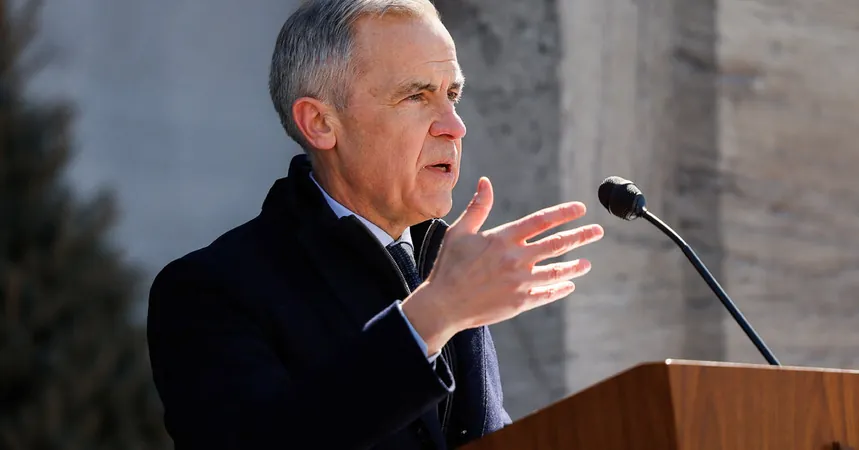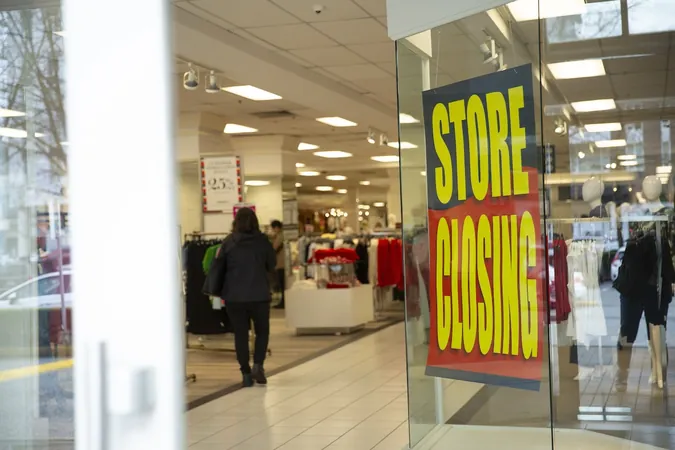
Canada on Edge: Mark Carney Calls for Snap Elections Amid Trump’s Hostile Actions
2025-03-24
Author: Amelia
In a surprising move, Canadian Prime Minister Mark Carney announced on Sunday that a federal election would take place on April 28, marking a pivotal moment in the nation’s uncertain political landscape. The decision comes as tensions rise between Canada and the United States, especially in light of President Trump's recent aggressive policies toward Canada.
Trump's administration has imposed punitive tariffs on a variety of Canadian goods, raising fears about an impending trade war. His rhetoric has escalated, ominously hinting at threats to Canada's sovereignty, traditionally seen as one of America's staunchest allies. “We are facing the most significant crisis of our lifetimes because of President Trump’s unjustified trade actions and threats,” Carney stated during a press conference in Ottawa.
Carney, who was newly elected as leader of the Liberal Party on March 9 and took office just days later, finds himself in a precarious position. With no seat in Parliament and his party lacking a majority, he faced a looming no-confidence vote, thus necessitating a swift call for an election. “We will not let that happen,” he asserted, highlighting a determination to protect Canada’s integrity.
In the wake of Trump's presidency, political dynamics have shifted dramatically. The Liberal Party's main rival, the Conservatives, led by Pierre Poilievre, had previously maintained a solid lead in the polls. However, Trump's antagonistic stance towards Canada has galvanized support for the Liberals, narrowing the Conservatives' lead from 25 points to a far more competitive margin.
Poilievre, seeking to distance himself from Trump by emphasizing a “Canada-first” approach, asserts his intentions to focus on cutting taxes and reducing regulations. However, he has faced criticism for adopting some of Trump's combative style, causing uncertainty among voters about his ability to stand up to the U.S. president.
The upcoming election will not just pit Carney against Poilievre—a seasoned campaigner—but also involve other significant political players. The Bloc Quebecois, led by Yves-François Blanchet, represents Quebec nationalism, while the New Democratic Party (NDP), under Jagmeet Singh, stands to the left of the Liberals. Interestingly, the NDP had previously supported the Liberal minority government but seems to be losing support as the election approaches.
As for the election process itself, Canada operates under a first-past-the-post system, meaning candidates with the most votes win in each riding, rather than needing an outright majority. Of the 343 electoral districts, a party must secure at least 172 seats to form a majority government. Without that, a minority coalition would need the support of other parties to pass legislation.
As the election draws near, Carney will navigate the challenges of being a political novice facing off against a more experienced opponent. The stakes are high, not only for his political future but for the direction of Canadian governance amid rising uncertainties with the United States. The next few months will be crucial for all parties involved as they court voters across the country, vying for the chance to lead Canada through these turbulent times.
Stay tuned for what promises to be an electrifying election season that could redefine Canada’s relationship with its neighbor to the south!









 Brasil (PT)
Brasil (PT)
 Canada (EN)
Canada (EN)
 Chile (ES)
Chile (ES)
 Česko (CS)
Česko (CS)
 대한민국 (KO)
대한민국 (KO)
 España (ES)
España (ES)
 France (FR)
France (FR)
 Hong Kong (EN)
Hong Kong (EN)
 Italia (IT)
Italia (IT)
 日本 (JA)
日本 (JA)
 Magyarország (HU)
Magyarország (HU)
 Norge (NO)
Norge (NO)
 Polska (PL)
Polska (PL)
 Schweiz (DE)
Schweiz (DE)
 Singapore (EN)
Singapore (EN)
 Sverige (SV)
Sverige (SV)
 Suomi (FI)
Suomi (FI)
 Türkiye (TR)
Türkiye (TR)
 الإمارات العربية المتحدة (AR)
الإمارات العربية المتحدة (AR)